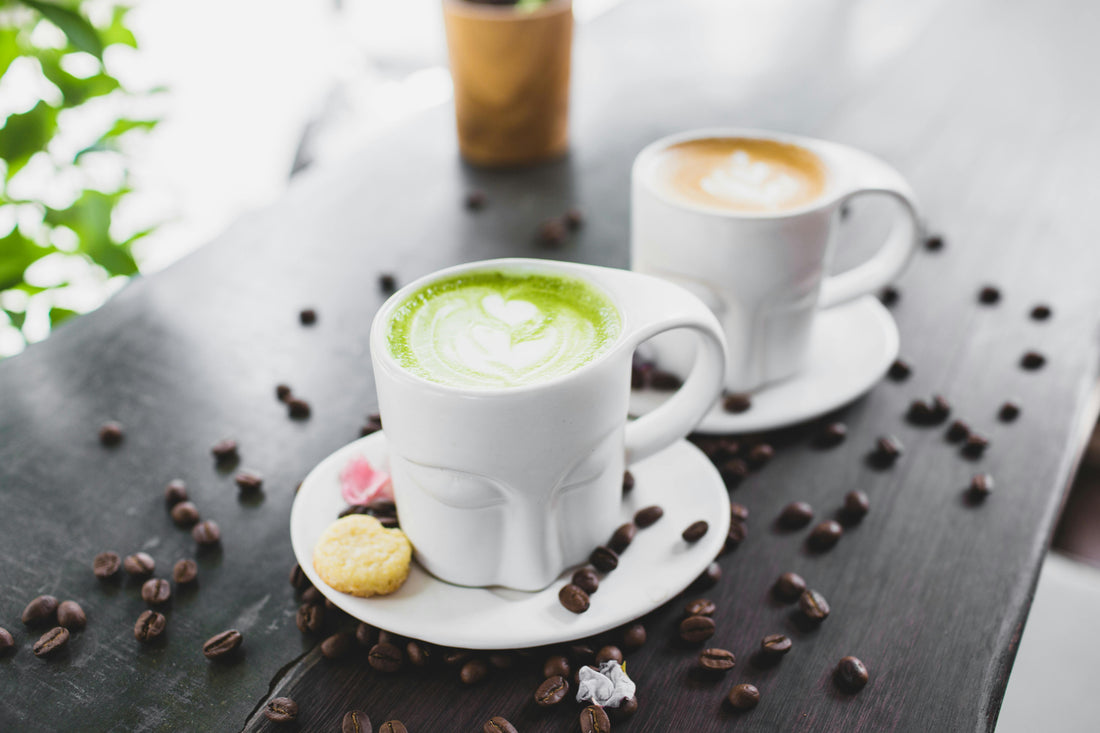
Matcha vs Coffee - Which is Better for Energy, Focus & Wellbeing?
Carolina RettigShare
Are you a loyal coffee drinker but curious about matcha? Or maybe the other way around, you love your daily matcha but wonder if it really beats coffee? In this post, we compare matcha and coffee in terms of taste, caffeine, health, and energy. Which drink suits you best, and can you swap one for the other? 💚☕
Caffeine: Matcha = Calm Energy, Coffee = Quick Kick (and Crash)
The biggest difference between matcha and coffee is how they affect your energy. Both contain caffeine, but your body processes them very differently.
Matcha has around 30–70 mg of caffeine per cup, but thanks to L-theanine (an amino acid that calms the brain) the effect is smooth, focused, and long-lasting. You’ll feel alert, clear-headed, and balanced - without jitters or racing heartbeat. Many describe it as a steady clarity that lasts for hours, perfect for work, study, or creative flow.
Coffee, on the other hand, averages 80–120 mg of caffeine per cup. It delivers a fast, intense energy spike, but it can fade just as quickly. For many, that means stress, shaky hands, or a sudden crash after a few hours… often leading to another cup (and then another).
➡️ Winner: Matcha - for steady energy and long-term focus.
Health in a Cup: Which Drink Boosts Your Body More?
Matcha is famous for its antioxidant power – especially EGCG (epigallocatechin gallate), which may reduce inflammation, support fat metabolism, improve cholesterol, and promote cellular health (health benefit of matcha) since you consume the entire leaf, you get up to 137x more antioxidants than regular green tea. Matcha also contains chlorophyll, vitamin C, potassium, iron, and even trace fibers – a true nutrient-dense superpowder.
Coffee has its health perks too, mainly from polyphenols (antioxidants). Studies link coffee consumption to reduced risk of type 2 diabetes, Parkinson’s, and Alzheimer’s, as well as benefits for liver health and metabolism (health benefit of matcha). It also provides small amounts of vitamins like B2, B3, and magnesium. However, its effects vary widely depending on how much you drink, your tolerance, and what you add to your cup.
➡️ Winner: Tie - both have benefits, but matcha wins on overall nutrient profile.
Taste & Versatility: Bitter Kick or Umami Experience?
Taste is personal, but it often decides which drink you stick with long-term.
Matcha has a smooth umami flavor with a touch of natural sweetness and fresh green notes. Some first-timers find it earthy or grassy, but it grows on you - especially in a creamy matcha latte with oat milk and vanilla. Plus, matcha is incredibly versatile: you can use it in lattes, smoothies, ice cream, baked goods, dressings, and more. It easily becomes a kitchen staple.
Coffee has a bold, bitter profile that many enjoy as a “grown-up taste.” Most people drink it black or with milk, but it’s less flexible in food and recipes. You rarely see coffee replacing flour or spice, while matcha can almost act as a seasoning itself.
➡️ Winner: Matcha - especially if you enjoy variety and smoother flavors.
Which is Better for Your Stomach?
Regular coffee drinkers often notice their stomach doesn’t always agree with it. Coffee increases stomach acid, which can lead to heartburn, irritation, and digestive discomfort. Some even find it triggers IBS or an urgent trip to the bathroom after that morning cup.
Matcha is much gentler on the stomach. Thanks to its lower acidity and calming L-theanine, it’s often a better option for sensitive digestion. Many who switch from coffee to matcha report fewer stomach issues, less acid reflux, and an overall calmer gut.
➡️ Winner: Matcha - for its gut-friendly effect.
Sustainability & Environmental Impact
Both matcha and coffee have environmental challenges, but matcha often stands out as the more sustainable option.
Matcha is grown on a smaller scale, often with traditional farming methods that protect soil health and biodiversity. At Zenzi Matcha, we also focus on sustainable, recyclable packaging to reduce environmental impact.
Coffee, meanwhile, is one of the world’s most heavily farmed crops, requiring large amounts of water and land. It’s sometimes linked to deforestation and high emissions. While many coffee farmers are adopting sustainable methods, it remains a global challenge.
By choosing responsibly sourced matcha, you’re making a more climate-conscious choice without compromising on taste or quality.
➡️ Winner: Matcha - for its lighter environmental footprint.
Dependency: How Matcha & Coffee Affect Habits
Both drinks contain caffeine, but they influence dependency differently.
Coffee delivers a strong, quick jolt that can easily lead to reliance. The cycle of “needing another cup” often results in dependency, and withdrawal can bring headaches, fatigue, and irritability.
Matcha also contains caffeine, but combined with L-theanine it provides a smoother, more balanced effect. This reduces the risk of dependency and makes it easier to enjoy caffeine without feeling overstimulated or addicted.
➡️ Winner: Matcha - for a balanced caffeine boost without dependency.
Conclusion: Do You Have to Choose?
Here’s the truth - you don’t have to pick one. Both drinks have their place, and many people enjoy them at different times of the day.
Some choose coffee in the morning and matcha later for calm focus. Others switch entirely to matcha for its antioxidants, steady energy, and stomach-friendly profile.
But if you’re looking for:
More balanced energy
Less caffeine crash
Higher antioxidant intake
A fresh new ritual in your routine
…then matcha is the perfect alternative (or complement) to coffee.
☕🍵 Curious about replacing your morning coffee with matcha?
Welcome to the Matcha Club! 💌
